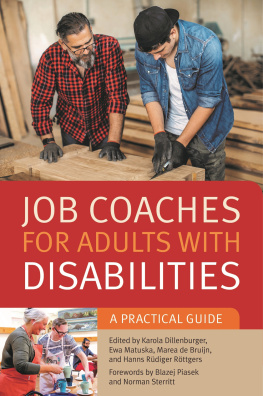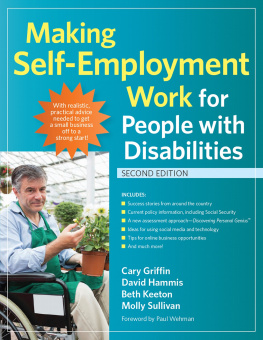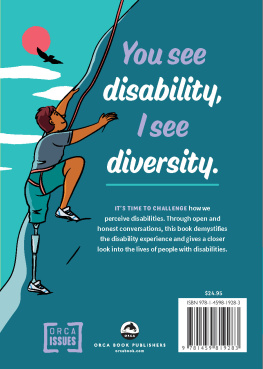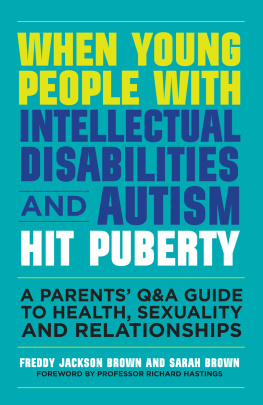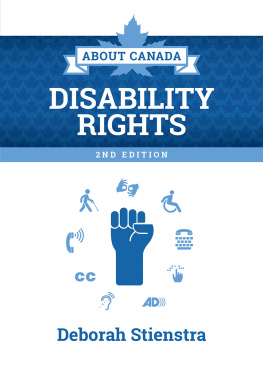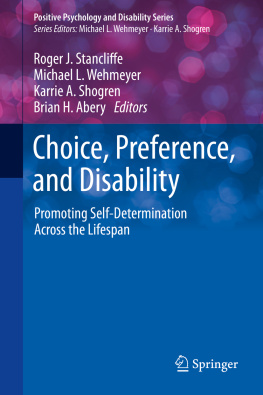
JOB COACHES FOR
ADULTS WITH
DISABILITIES
A Practical Guide
Edited by Karola Dillenburger, Ewa Matuska,
Marea de Bruijn and Hanns Rdiger Rttgers
Forewords by Blazej Piasek and Norman Sterritt

Jessica Kingsley Publishers
London and Philadelphia
CONTENTS
FOREWORD
Blazej Piasek
When I think of my nephew, a smile of joy and pride appears on my face. For almost 25 years he has faced the challenges of everyday life. First, the struggle for life, heart surgery, cancer, the fear of an inability to move independently, then school education, step-by-step, without any special assistance or treatment. Surrounded by the love and support of his family, each day he moves towards the moment of independence. Yet, unfortunately, this moment seems to elude him, constantly moving further away in time. This is hard to accept, for him and for his family, especially when his brothers are growing up and leaving the family nest.
The urgent need for medical rehabilitation has passed now, and the next step in my nephews battle for independence is to get a job. But in order to achieve this goal he needs the support of a specialist someone who is knowledgeable and supportive in the process of social and vocational rehabilitation. That person should be a job coach. The role of the job coach fuses the competences and roles of a consultant, an employment agent, a job instructor, a social worker, and at times, a therapist.
Job coaches work in three stages. The most important first stage is supporting the adult with disabilities in the process of vocational rehabilitation, job searching and gaining employment. The second stage is creating an appropriate job environment, where the job coach works collegially with the employer and the co-workers of the employee with disabilities. The third stage is about taking care of relations with those closest to the adult with disabilities their family and friends.
In order to better understand the need for and the role of the job coach for people with disabilities we need to first define our understanding of disability. Is it the perception through the prism of our own limitations and imperfections, or perhaps a definition included in legal acts related to medical research, tests and diagnosis?
The World Health Organization (WHO 2017) defines disability as an umbrella term, covering impairments, activity limitations and participation restrictions impairment, as a difficulty in physical functioning or structure; activity limitation, as a problem encountered in executing a task or action; participation restriction, as a problem experienced by an individual in involvement in social and other life situations.
But a disability is not just a physical health problem. It is a complex phenomenon, reflecting the interaction between features of a persons body and features of the society in which they live. Overcoming the difficulties faced by people with disabilities requires interventions to remove environmental and social barriers. And one of the most important aspects of social inclusion is work employment.
In this book readers will have the opportunity to become familiar with the role of the job coach in the process of vocational rehabilitation. They will learn about formal requirements, the scope of qualifications as well as the practical aspects of this profession. They will learn about different forms of disability and the special kinds of support the job coach can offer. Importantly, readers will hear directly from adults with disabilities who have a job coach, and from job coaches who support these employees, thus reflecting the atmosphere of the profession.
This book brings us closer to the world of people with disabilities and the work of job coaches. It gives us a glimpse of the similarities and differences in life experiences. It gives us a chance to release for a moment from our own virtual reality understanding others and ourselves better, noticing another human being for who they are, to see something more than disability.
Blazej Piasek, Warsaw, Poland
References
WHO (World Health Organization) (2017) Disabilities. Accessed on 22/02/2018 at www.who.int/topics/disabilities/en
FOREWORD
Norman Sterritt
I have been involved with the development and management of supported employment services in Northern Ireland since the late 1990s, and I am both delighted and honoured to have been asked to compose this Foreword for the book, Job Coaches for Adults with Disabilities .
I first met many of the contributors to this book in the autumn of 2016 when I was invited to engage with a group of researchers from across Europe who were meeting at Queens University Belfast to share and compare their experiences of job coaching within their respective countries. This occasion provided the opportunity to share experiences and knowledge gained over many years in relation to the roles typically performed by job coaches within local, national and international agencies.
Within Northern Ireland the supported employment model has been used successfully by local disability organisations for many years. It is recognised within the Northern Ireland Employment Strategy for People with Disabilities as the most appropriate delivery model to improve the job prospects and working careers of people with disabilities.
The job coach role is central to the delivery of the supported employment model, and has existed informally for many years. This book contributes to the recognition of the professionalism of those skilled and dedicated workers who carry out this role.
This book offers a unique combination of expertise and personal experiences from a broad range of stakeholders. This includes supported employees with disabilities, job coach practitioners, researchers and experts across a wide range of disciplines. Each contributor brings a wealth of experience, research, knowledge and examples of best practice approaches, for assisting individuals availing of job coach support.
The structure of each chapter, commencing with a brief overview of the content, provides a quick and easy means for the reader to locate information about their immediate area of interest, for example, the focus on a particular disability or an insight into aspects of the role of job coach itself.
The opening chapter advocates for the recognition and professionalisation of the job coach role, acknowledging the expertise, skills and competences required. Some of the chapters provide specific guidance and examples of interventions and best practice approaches for those working with various disability groups, while others give generic understanding and insight into interventions pertaining to the job coach role. provides a particularly useful insight to, and analysis of, employers experiences in this area. The concluding chapter provides a steer for the preparation of job coaches of the future, and outlines the wide-ranging knowledge, skills and competences required for the job within a multidisciplinary context.
For those contemplating a career as a job coach, this book provides a comprehensive overview of the requirements of the role and the values, attributes and competences required and expected of the prospective job coach. Equally, for experienced job coach practitioners, this book brings a depth of understanding of the challenges typically encountered by job coaches as they support jobseekers with disabilities. For those tasked with managing supported employment services, the book contains useful information related to the recruitment and selection of job coaches and guidance that will inform the continuous professional development of the job coach role. The book also provides a comprehensive reference resource for other stakeholders interested in the subject, and represents an invaluable body of work for those researching the topic.
Next page
